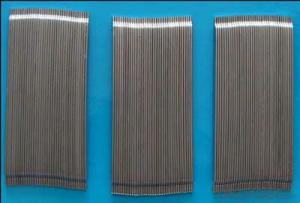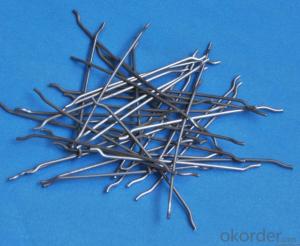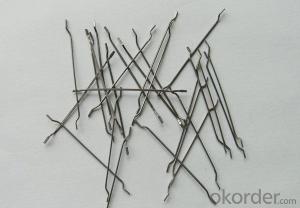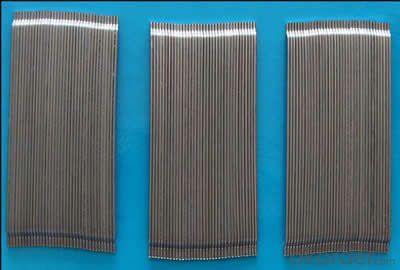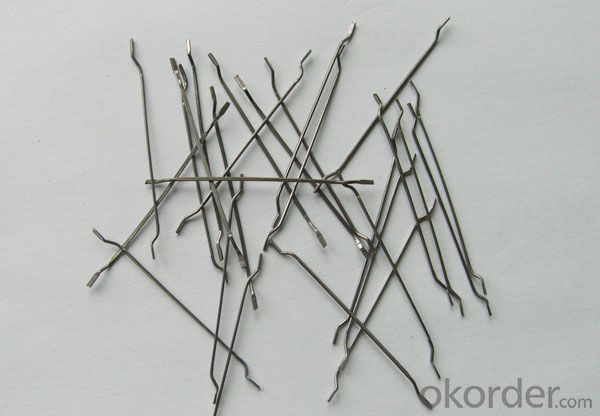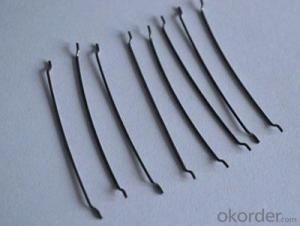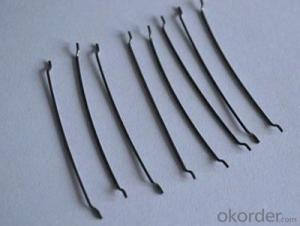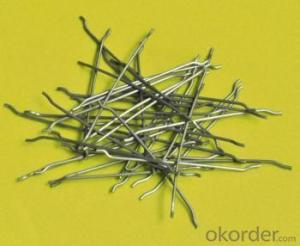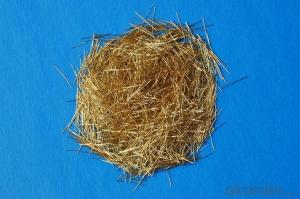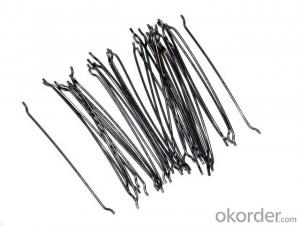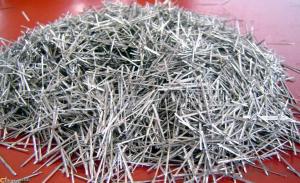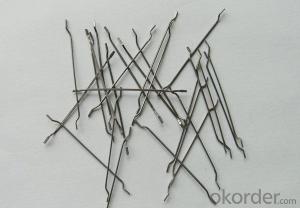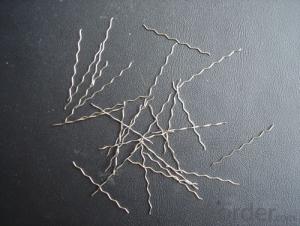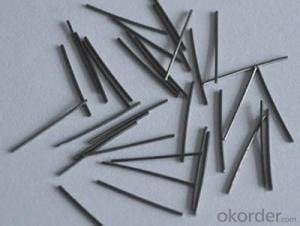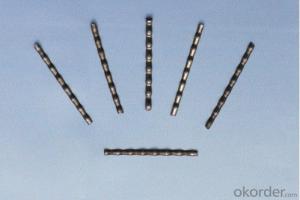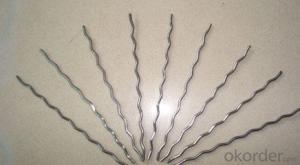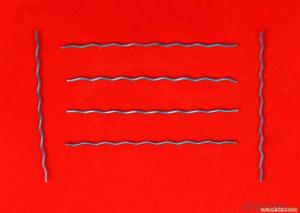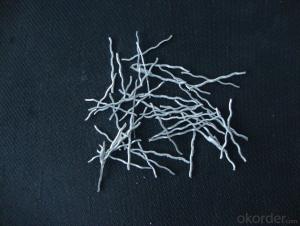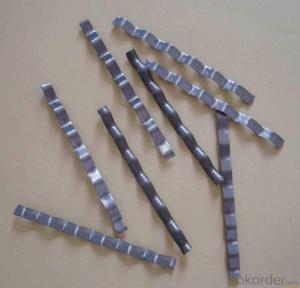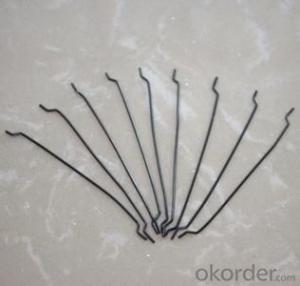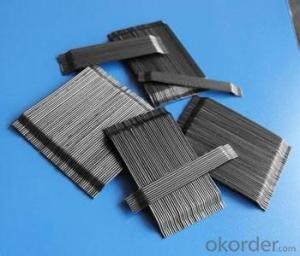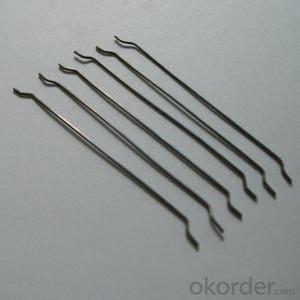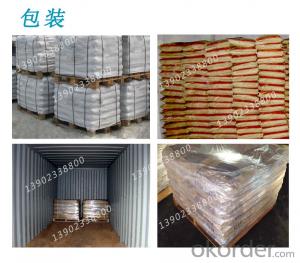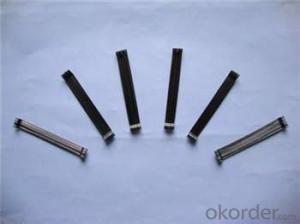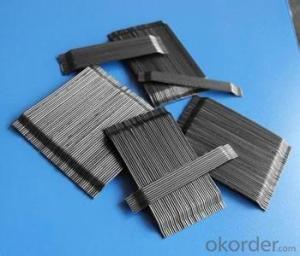Melt Extract Stainless Steel Fiber Reinforced Concrete Admixtures
- Loading Port:
- Tianjin
- Payment Terms:
- TT OR LC
- Min Order Qty:
- 1000 kg
- Supply Capability:
- 250000 kg/month
OKorder Service Pledge
OKorder Financial Service
You Might Also Like
Quick Details
Place of Origin: Shandong, China (Mainland)
Model Number: steel fiber
material: steel wire
application: concrete reinocement
type: end hook steel fiber
Product features
with excellent tensile ,hightenacity ,against cracking and fatigue ,they`re widely usd in the structures made of concrete
Specifications
1.hooked steel fiber
2.CE and ISO9001:2008
3.diameter from 0.5mm to 1.2mm
4.competitive price,high quality and service
Hooked Steel Fiber:
1.Diameter:0.5mm-1.0mm
2.Length: 25mm-60mm
3.Material: low carbon steel wire
4.Feature: excellent tensile,high tenacity,against cracking,impact and fatigue
5.Uses: high way,tunnel,building,airport road serface and so on .
Picture
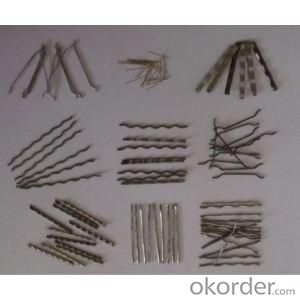
steel fiber concrete reinforced
1.hooked steel fiber
2.CE and ISO9001:2008
3.diameter from 0.5mm to 1.2mm
4.competitive price,high quality and service
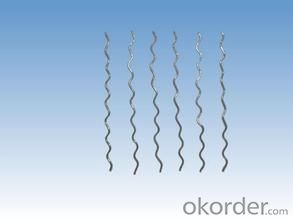
FAQ
we can produce any type steel fiber and of course we can make production according to your requirement
we have specilize in this field for almost 10 years ,with good quality and competitive price
- Q: Can melt extract stainless steel fiber be used in thin concrete sections?
- Indeed, it is possible to employ melt extract stainless steel fiber in thin concrete sections. By incorporating stainless steel fibers into such sections, the mechanical properties and overall performance of the concrete can be significantly improved. These fibers effectively reinforce the concrete, bolstering its resistance to cracking and shrinkage. This becomes particularly crucial in thin sections, where the concrete is more susceptible to these concerns. Furthermore, the presence of stainless steel fibers enhances the durability and lifespan of the concrete, rendering it suitable for diverse applications, including thin sections.
- Q: What is a steel fiber cement?
- Ordinary concrete adds steel fibers to it, which is resistant to compression, bending and tensile
- Q: How does melt extract stainless steel fiber improve the resistance of concrete to chloride ingress?
- Melt extract stainless steel fiber plays a crucial role in enhancing the resistance of concrete to chloride ingress. When added to the concrete mixture, these stainless steel fibers provide a physical barrier that impedes the movement of chloride ions into the concrete matrix. Chloride ions are a leading cause of corrosion in reinforced concrete structures, as they penetrate the concrete and reach the steel reinforcement, leading to its corrosion and eventual degradation. This corrosion not only compromises the structural integrity of the concrete but also reduces its service life. The presence of melt extract stainless steel fibers in the concrete effectively reduces the permeability of the material, limiting the ingress of chloride ions. These fibers create a network within the concrete, forming a three-dimensional reinforcement system that restricts the movement of chloride ions. Additionally, the stainless steel fibers enhance the mechanical properties of the concrete, making it more resistant to cracking and spalling caused by chloride-induced corrosion. They improve the tensile and flexural strength of the concrete, minimizing the potential for crack formation and propagation. Furthermore, melt extract stainless steel fibers also act as a sacrificial anode, preventing the corrosion of the steel reinforcement. As the chloride ions come into contact with the stainless steel fibers, they are attracted to the fibers instead of the reinforcement, reducing the risk of corrosion. In summary, melt extract stainless steel fibers improve the resistance of concrete to chloride ingress by creating a physical barrier, reducing permeability, enhancing mechanical properties, and acting as a sacrificial anode. These fibers significantly extend the service life of concrete structures by mitigating the detrimental effects of chloride-induced corrosion.
- Q: What is the lifespan of melt extract stainless steel fiber in concrete?
- The lifespan of melt extract stainless steel fiber in concrete can vary depending on various factors such as the quality of the fiber, the concrete mix design, and the exposure conditions. However, on average, melt extract stainless steel fiber can provide long-term durability and performance for at least 30 to 50 years in concrete structures.
- Q: Can melt extract stainless steel fiber be used in precast tunnel invert segments?
- Precast tunnel invert segments can indeed utilize melt extract stainless steel fiber. This type of stainless steel fiber is commonly employed in precast concrete applications to bolster the concrete's mechanical properties and endurance. By offering exceptional crack resistance, impact resistance, and ductility, it significantly enhances the concrete's overall performance. Due to its high tensile strength and corrosion resistance, melt extract stainless steel fiber is particularly well-suited for deployment in challenging environments like tunnels. Its utilization aids in the enhancement of flexural strength and load-bearing capacity in precast tunnel invert segments, thereby guaranteeing their long-term structural integrity. Moreover, the inclusion of stainless steel fiber can also diminish the necessity for traditional reinforcement, streamlining the production process and reducing expenses.
- Q: Is melt extract stainless steel fiber suitable for use in seismic regions?
- Melt extract stainless steel fiber is well-suited for use in regions prone to earthquakes. These seismic areas necessitate materials capable of enduring the forces and movements that occur during seismic events. Melt extract stainless steel fiber possesses exceptional tensile strength and ductility, which enables it to withstand intense shaking and ground movement without cracking or breaking. Moreover, it enhances the flexural and shear strength of concrete, which is vital for maintaining the structural integrity of buildings and infrastructure in seismic regions. Additionally, stainless steel fibers are resistant to corrosion, guaranteeing long-lasting durability and performance in these locations. Consequently, melt extract stainless steel fiber is a dependable and appropriate choice for reinforcing concrete structures in seismic regions, offering added safety and stability during seismic events.
- Q: What is the diameter range of melt extract stainless steel fiber?
- Typically, melt extract stainless steel fibers have a diameter range of 5 to 50 micrometers.
- Q: What is the effect of melt extract stainless steel fiber on the freeze-thaw resistance of concrete?
- The addition of melt extract stainless steel fiber to concrete has a significant positive effect on its freeze-thaw resistance. Stainless steel fibers are highly resistant to corrosion and have excellent mechanical properties, making them ideal for enhancing the durability of concrete in harsh environmental conditions. During freeze-thaw cycles, water in the concrete pores expands when it freezes, exerting pressure on the surrounding material. This pressure can cause cracking and deterioration of the concrete, leading to reduced strength and increased permeability. However, the inclusion of melt extract stainless steel fibers helps to mitigate these effects. The fibers act as reinforcement within the concrete matrix, effectively bridging microcracks that may occur during freeze-thaw cycles. This bridging effect helps to distribute stress and prevent the propagation of cracks, thereby improving the overall durability of the concrete. Furthermore, stainless steel fibers have a low thermal conductivity, which reduces the transfer of heat from the surrounding environment to the concrete. This slower temperature change minimizes the formation of ice crystals within the concrete during freezing, further reducing the potential for damage. Overall, the addition of melt extract stainless steel fiber to concrete enhances its resistance to freeze-thaw cycles, increasing its durability and lifespan. This improvement in freeze-thaw resistance is crucial in regions with cold climates or areas where concrete structures are exposed to frequent temperature fluctuations.
- Q: Can melt extract stainless steel fiber be used in residential driveway pavements?
- Yes, melt extract stainless steel fiber can be used in residential driveway pavements. Stainless steel fibers are commonly used in concrete applications to enhance its strength, durability, and resistance to cracking. They are often added to the concrete mix to improve its performance and longevity. In the case of residential driveway pavements, melt extract stainless steel fiber can provide several benefits. Firstly, it can help to reduce cracks and surface defects that may occur due to heavy vehicle traffic or changes in weather conditions. The fibers reinforce the concrete, making it more resistant to shrinkage, expansion, and cracking. Additionally, stainless steel fibers can enhance the overall strength of the concrete, increasing its load-bearing capacity. This is particularly important for driveway pavements, which need to withstand the weight of vehicles and regular usage. The fibers distribute the loads more evenly across the pavement surface, reducing the risk of structural damage. Moreover, stainless steel fibers are corrosion-resistant, ensuring the longevity of the driveway. They are not affected by moisture, chemicals, or other environmental factors that can cause deterioration. This makes them ideal for residential driveways, as they can withstand the various conditions they are exposed to. Overall, melt extract stainless steel fiber can be a valuable addition to residential driveway pavements. It improves the strength and durability of the concrete, reduces cracking, and enhances the overall lifespan of the driveway. By using stainless steel fibers, homeowners can ensure that their driveway remains in good condition for years to come.
- Q: Can melt extract stainless steel fiber be used in asphalt or bitumen?
- Yes, melt extract stainless steel fiber can be used in asphalt or bitumen. The addition of stainless steel fibers enhances the mechanical properties of the asphalt mixture, improving its durability, crack resistance, and fatigue resistance. Moreover, stainless steel fibers can also help in reducing rutting and thermal cracking in asphalt pavements.
Send your message to us
Melt Extract Stainless Steel Fiber Reinforced Concrete Admixtures
- Loading Port:
- Tianjin
- Payment Terms:
- TT OR LC
- Min Order Qty:
- 1000 kg
- Supply Capability:
- 250000 kg/month
OKorder Service Pledge
OKorder Financial Service
Similar products
Hot products
Hot Searches
Related keywords
